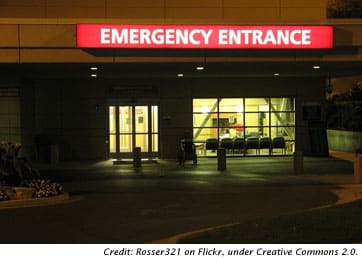
 (WOMENSENEWS)–The Lap-Band is often portrayed as the quick and easy fast food drive-through version of weight-loss surgeries.
(WOMENSENEWS)–The Lap-Band is often portrayed as the quick and easy fast food drive-through version of weight-loss surgeries.
Getting the device implanted around the stomach takes no more than an hour, the procedure is less invasive than other weight-loss surgeries and patients are out of the hospital and back to work within days–in theory.
Yet the majority of Lap-Band patients experience post-operative complications that include vomiting, abdominal pain, nausea, renal failure and an inability to swallow, making the procedure anything but routine.
Last month, the Food and Drug Administration approved making the Lap-Band–which cinches the stomach and makes patients feel full quicker–available to millions more less-overweight adults. The vast majority of those who opt for the surgery are women.
With one-third of Lap-Band patients requiring a surgical revision–and up to 90 percent experiencing mild to acute complications–Dr. Edo Aarts, a leading bariatric researcher from Rijnstate Hospital in the Netherlands, says the decision could add emergency room visits and tap taxpayer dollars.
"This could lead to a tremendous burden on the health care system," he said in a recent phone interview with Women’s eNews.
Surgery Insurance Coverage Common
Although policies vary between state and insurance provider, bariatric surgeries are often covered by insurance because they are considered medical treatment for obesity.
For those paying out of pocket, gastric banding runs from $17,000 to $30,000.
But surgical revisions and band removal–as well as surgeries to get rid of excess skin after weight loss or lift sagging body areas–can be excluded from coverage.
As a result, there is some evidence that patients are turning to emergency rooms as a costly "back door" means of getting the care they need.
Emergency room overcrowding is already a major issue in hospitals across the country. The closure of emergency facilities, staff shortages and an increasingly large uninsured population are just some of the factors contributing to overcrowding, according to a 2004 survey by the American Hospital Association, a trade group based in Washington, D.C.
The Atlanta-based Centers for Disease Control and Prevention tallied 116.8 million emergency room visits nationwide in 2007. A growing senior population and more uninsured patients using the emergency room are expected to push up that number.
Online Forums Expose Complications
Gastric bands like Allergan’s Lap-Band and Johnson and Johnson’s Realize band have been marketed as safe and effective. However, the assessment is not unanimous. Online patient forums provide a window on some of the common complications.
In forums on sites such as http://www.lapbandtalk.com and www.obesityhelp.com gastric banding patients seek support from other "bandsters" about vomiting when the band is cinched too tightly or having to sleep sitting up to relieve abdominal pains. Some mention they’d like the device removed but their insurance won’t cover a second operation.
Emergency room doctors at Northwestern Memorial Hospital in Chicago have seen more people coming into the emergency room with bariatric complications over the past five years and attribute the increase to the rise in weight loss surgery, according to a spokesperson for Northwestern.
Emergency room visits for weight loss surgery complications are common enough that the American Society for Metabolic and Bariatric Surgery, based in Gainesville, Fla., has published a colorful chart called Clinical Pearls for Emergency Care of the Bariatric Surgery Patient.
It instructs emergency room doctors on handling intra-abdominal bleeding, pulmonary embolisms, band slippage, vomiting and severe abdominal pain, just some of the common reasons gastric banding goes awry.
Besides acute complications, emergency room doctors also commonly see vitamin deficiencies and electrolyte imbalance in gastric banding patients due to failure to absorb nutrients in food (caused by the constricting nature of the band) and difficulty in swallowing.
Would you like to Comment but not sure how? Visit our help page at https://womensenews.org/help-making-comments-womens-enews-stories.
Would you like to Send Along a Link of This Story?
https://womensenews.org/story/medicine/110314/lap-band-complications-could-tie-nations-er?page=0,1
Alizah Salario is a freelance journalist based in Chicago. Her work has appeared in The Daily Beast, Ms. Magazine and elsewhere. You can learn more at www.alizahsalario.com or follow her on Twitter at http://twitter.com/Alirosa.
For more information:
The American Society for Metabolic and Bariatric Surgery’s " Clinical Pearls for Emergency Care of the Bariatric Surgery Patient":
http://207.234.185.112/$sitepreview/asmbspreview.com/downloads/er_poster/ASMBS_ER_Poster9-20-10.pdf
"Bariatric Surgery: The View From a Doctors’ Group," The New York Times:
http://www.nytimes.com/2011/01/20/opinion/lweb20obese.html?scp=1&sq=bariatric%20physicians&st=cse
"Allergan seeks bigger market for Lap-Band weight-loss device," Los Angeles Times:
http://www.latimes.com/health/la-fi-allergan-20110116,0,5957731.story


